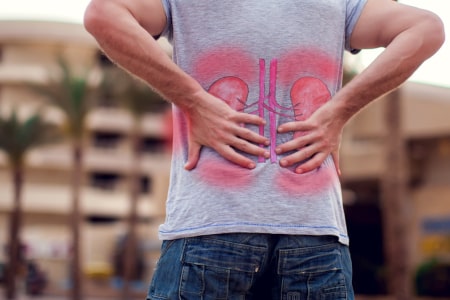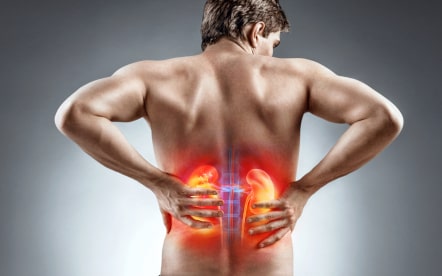Fatigue and back pain with kidney problems
Your kidneys are essential for managing waste levels in your blood. If your kidney function is impaired, all sorts of physical problems arise, including nausea, back pain and even skin irritation. In this blog post we focus on two typical symptoms of kidney problems: fatigue and back pain. Dorsoo can help you with this. Not with medicines or a diagnosis, but with a made-to-measure bed for better sleep.
What are your kidneys good for?
You can easily regard your kidneys as sort of constant waste processor. What exactly do they do? The two kidneys filter around 1,750 litres of blood every day. They remove waste and excess water. They additionally regulate your blood pressure, and they stimulate the production of bone tissue and red blood cells.
Symptoms of kidney disorders
Your kidneys are located under your midriff, towards the spinal column. One on the left, the other on the right. As your kidneys are so essential for filtering your blood, they can be the source of many problems. If your kidneys are failing, you will notice it right away.
Do you suspect you have a kidney problem? Then you should see your family doctor. Preferably as soon as possible. Here we give you a list of symptoms that may indicate kidney problems:
- Back pain
- Nausea
- Fatigue and lethargy
- High blood pressure
- Muscle cramps
- Itchy, dry skin
- Very small urine volume and dark urine
In this blog we focus on two symptoms: back pain and fatigue. Why? We know that a Dorsoo bed does not replace a kidney specialist. However, our beds can help to ease your back pain and fatigue.

The difference between back pain and kidney pain
Your kidneys are located under the ribs near the back. As a result, kidney pain is often confused with back pain. However, there are distinct differences. Earlier in this blog we listed some symptoms from which you can determine that you may have a kidney problem. How can you distinguish between kidney pain and back pain?
Kidney pain
- Pain in the lower back or on the edge of the back.
- Pain in the side, just above the hip.
- The two complaints above are accompanied by pain when urinating.
- Shooting, continuous pain.
Back pain
- Pain that you mainly feel when you make an awkward movement.
- Pain in the upper or lower back. The latter radiates to the leg and/or buttock.
- Numbness in the back and legs.
- Intermittent pain.

Fatigue with kidney disorders
Patients with kidney disorders often complain of fatigue. This is largely related to a kidney function we have not yet mentioned: hormone production. For example, they produce the hormone erythropoietin, which is responsible for making red blood cells. You probably know it by the abbreviation epo. And if you are interested in competitive cycling, you also know that around 20 years ago there were professional cyclists who used epo as doping.
Why is epo administered to kidney patients? Because they produce less of this hormone. As a result, the patients have fewer red blood cells in their blood. This is one of the reasons why kidney patients get fatigued faster. What other factors cause fatigue with kidney disorders?
- More waste products: Since the kidneys do not work as well, more waste products remain in the blood. The body has to work harder to continue functioning.
- Iron deficiency (anaemia): if the kidneys are damaged, the blood does not take up iron as quickly. This iron is necessary in order to make red blood cells.
- Fluid accumulation: Failing kidneys are less effective in filtering salt out of your body. This in turn reduces the removal of excess water. Fluid accumulates almost everywhere in the body. This by itself is fatiguing. In addition, the lungs also accumulate more fluid, making it harder to breathe.
- Overweight: Kidney disorders and obesity are like the chicken and egg. The question is which one came first. In any case, the two often occur together.


